- 6 April 2015
- US & Canada
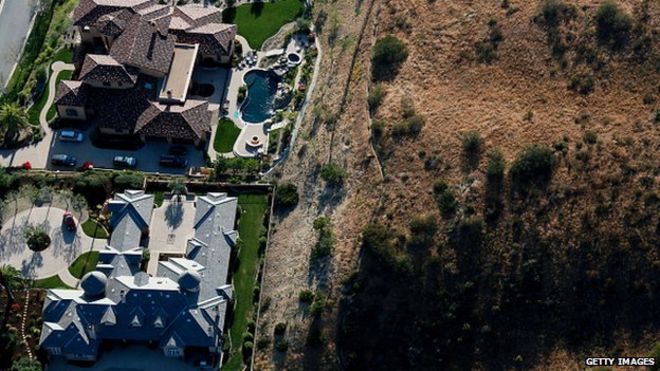
California Governor Jerry Brown has instituted new water restrictions as the state's reservoirs have fallen to perilously low levels - but will the rules change how Californians see water?
California is facing a catastrophic environmental disaster. America's erstwhile Golden State is in the midst of a severe drought which shows no sign of letting up.
Even the threat of earthquakes seems to fade in comparison to the water crisis, now in its fourth year.
Nasa scientists have projected that reservoirs could run dry within a year and there is growing pressure on ground water supplies, which are dwindling rapidly.
The drought is a problem of epic proportions and it could - many say should - result in a seismic shift in attitudes towards water.
"Hopefully people will look at a green lawn and find it as annoying as second-hand cigarette smoke," says Nancy Vogel of the California Department of Water Resources.
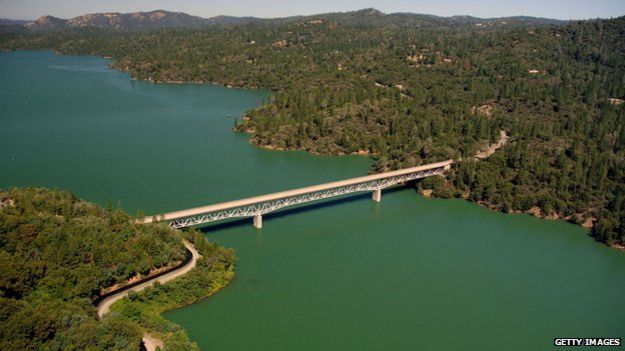
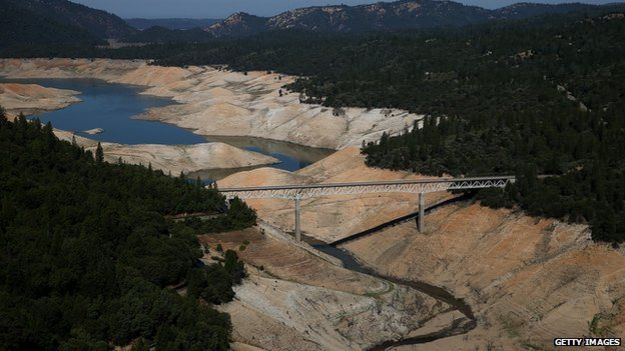
Last week the state's governor, Jerry Brown, announced mandatory water rationing on scale that California has never experienced before. The goal is a 25% reduction in usage.
"He's been asking us to cut back going back to last winter and we haven't stepped up," says Jay Famiglietti, University of California, Irvine and senior water scientist at Nasa's Jet Propulsion Laboratory.
Famiglietti argues that Brown's tough love approach is necessary because so many people are apathetic towards water conservation.
"This is the next logical step and I think it sends a very strong message to all Californians about just how serious this situation is."
But the governor's plan has been criticised for not requiring similar rationing for farmers, who make up the large majority of the state's water usage.
Meanwhile, local authorities and individuals have been put on notice that beautifully manicured green lawns should go.
Homeowners will not be forced to remove them, although many cities have introduced limits on the number of days irrigation systems can be used.
And cities have been ordered to stop watering ornamental grasses in the median areas of highways.
"For the average Californian the easiest and quickest way to save water is to turn sprinklers off," Ms Vogel says.
"Just let the lawn go brown or replace it with drought tolerant landscaping."
About 50% of water used in residential areas is outside the home.
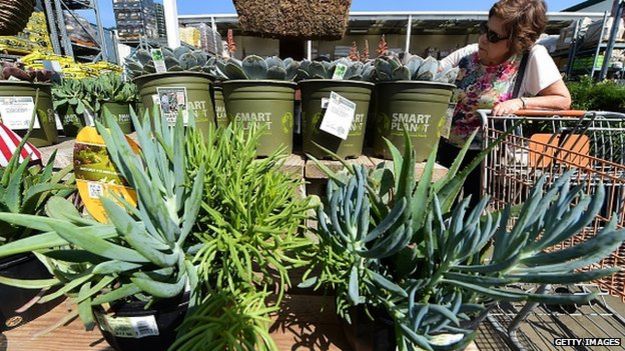
"People routinely over-water their lawns and use water to do things like hosing down the side walk when a broom would do," says Felicia Marcus, chair of the State Water Resources Control Board.
Getting rid of grass will be a huge lifestyle shift for many, but it is the biggest single measure that individual Californians could take to ease the crisis, according to Famiglietti.
"Drought tolerant native landscape is beautiful - we just have to get over this grass thing," he explains.
"We live in an arid and semi-arid state and we need to start acting that way."
But will Californians heed the warnings and change their ways?
Success for state officials hinges on enforcement of the governor's executive order. It will be largely up to local water districts to figure out how to cut consumption by a quarter.
Local providers have been ordered to provide a full account of their efforts to implement the new rules.
They have been authorised to impose fines of up to $500 (£334) on individuals caught wasting water and the agencies themselves could be fined up to $10,000 for failing to comply.
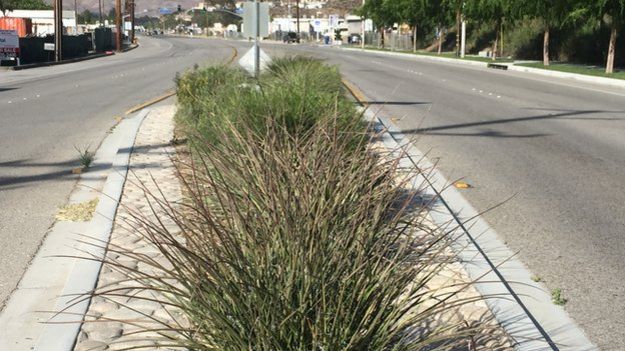
But officials are keen to stress that their approach will be based on an education-first policy, where the goal is to get the message out about conservation.
This includes letting home-owners know about schemes that help them replace their lawn, for free.
"The governor's order involves carrots as well as sticks and has directed the appropriate agencies to work on assisting locals with turf buy-outs and rebates to get more efficient appliances and fixtures," says Marcus.
"These will give permanent savings, not just behavioural savings for the moment."
Californians have been deluged with advice about ways to save water. They include not running the tap while cleaning your teeth, keeping showers short and fixing leaky toilets, pipes and faucets.
"If it's been in your home for 20 years or so you can probably get a more efficient toilet that uses less water," says Vogel.
Some experts suggest car-loving Californians should even stop washing their vehicles.
In Los Angeles, restaurants have been ordered to stop automatically serving diners with of water. They can oblige if customers ask for it, but significant savings can be made mostly through using less water to clean the glasses afterwards.
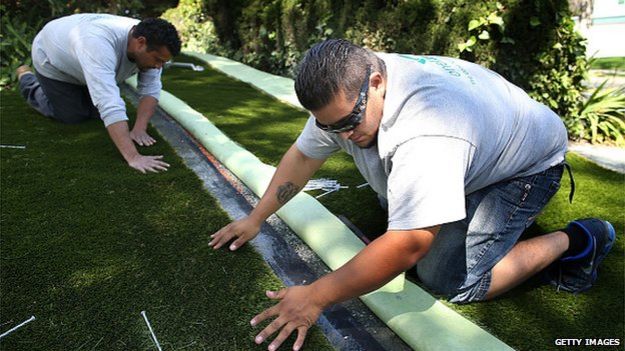
"It's also a very effective communication reminder that we're in a drought," Marcus says.
There will be no army of water-saving police patrolling the streets to ensure that people do their bit. For the most part, it will be down to individuals to self-enforce the rules.
But some local water agencies have enlisted the public to play water cop by using an app on their smartphone.
It allows users to snap a photo of their offending neighbour and to send it directly to the water authority. It usually results in a warning letter about issues such as leaky irrigation but could lead to a prosecution.
"That's a little frightening," Famiglietti says of the Big Brother approach.
"I don't want to adopt a holier-than-thou attitude but I think it is appropriate for neighbours to talk to one another and encourage each other to save water."
"It is commonly owned and we have to come to grips with the fact that we don't have enough," he says.
"Together, as a community, we'll let one another know how important this is and, in a sense, police ourselves without the power of the state," says Vogel.
"We don't have the resources at the state level to be in everybody's back yard shutting off sprinklers," she adds.
Californians have always prided themselves on their progressive thinking and willingness to go out on a limb. But this will require a shift in mindset from a state of US migrants.
Lush lawns and lavish water features, typically found in Beverly Hills and other rich communities, go hand in hand with a lifestyle that optimises wealth and success.
"People recreated the landscapes that they came from, such as the mid-west and the east which were more water-rich climates and for many people the yard just came with the house," says Marcus.
"It is not a necessity and we have been trying to train people to rethink it."
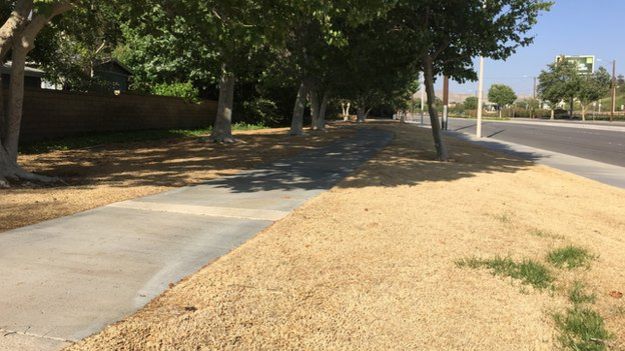
But even as the drought crisis deepens, the water seems to flow in certain neighbourhoods, unabated.
It is notable that less well off communities enjoy far less greenery. The onus will be on the well-heeled to revise their image of what is appropriate landscape for California.
Ms Vogel adds that Californians will have to re-evaluate their "notion of pretty" and become a lot more water-wise.
"We need to get to the point where we don't expect our landscape to look like Iowa," she says
No comments:
Post a Comment